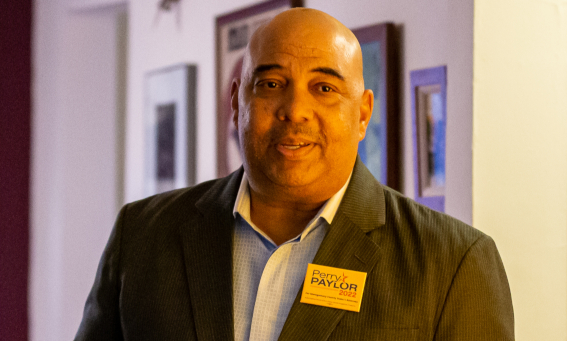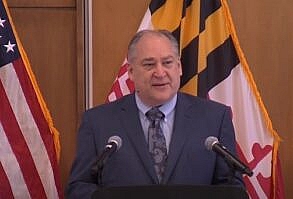Perry Paylor is running for Montgomery County State’s Attorney. He is a lifelong resident of Silver Spring, graduated from Paint Branch High School. He currently serves as Deputy State’s Attorney in Prince George’s County, where he is part of the leadership team managing a $20 million budget and as many as 1,000 simultaneous cases. He directly oversees the Guns & Drugs and Major Crimes Units. Perry has won endorsements that include CASA In Action, Working Families Party, and Jews United for Justice Campaign Fund. The interview covered topics of professional experience, Ghost Gun Legislation, racial justice, defunding police, behavioral health, reforms and rehabilitation of prisoners.
Professional Experience:
Nagender Madavaram: You are working in Prince George’s County State’s Attorney Office and managing around $20 million budget. What experience you can bring to Montgomery County?
Perry Paylor: Well, I grown up in Montgomery County and graduated from Paint Branch High School. I’ve been practicing law since 1996. My current position is Deputy State’s Attorney in Prince George’s County where I manage 4 prosecutorial units. I also manage the Grand Jury Screening Unit that unit reviews and decides which cases will be indicted in Circuit Court and in District Court. I had the Pro Trial Unit which defends convictions against people who are seeking post trails. I also manage Major Crimes Unit and that unit handles cases anything that is not a homicide, financial crime or sexual crimes but carjackings, robberies, attempted murders, burglaries and thefts. Guns and Drugs unit also in my portfolio. Five attorneys directly report to me. Any given day, I’m responsible for thousand criminal cases. I am part of leadership which manages $29 million budget. I think that kind of experience makes me the leading candidate to replace incumbent.
Ghost Gun Legislation:
Nagender Madavaram: Maryland passed Ghost Gun Legislation. I heard that you played some role in passing the legislation. What was your role in passing Ghost Gun Legislation?
Perry Paylor: Sure, thank you for asking that question. First of all, it went into effect just on Wednesday, June 1st. We worked with the members of both Prince George’s and Montgomery County delegations. Looking at the various issues surrounding ghost guns and the law doesn’t really define it. First of all, they’re called privately manufacturer firearms and people get them through various ways. Most of the time, people order gun parts from companies. Once you assemble them then they become functioning firearms. Current laws don’t regulate assembled guns and people can get around the laws for transporting and mailing firearms. The assembled firearms are not serialized. They don’t have serial numbers, so they can’t be traced, and therefore there’s no requirement for background checks. So, any person under 21 or someone convicted of a crime can get firearm without trace.
We’ve seen the increase of 3D printers for manufacturing ghost guns. 3D printers look almost like microwave ovens. You can have the mold, you can purchase the filament and actually make your own functioning firearm. Those firearms do not have serial numbers and regulations. There was no regulation until we passed the law. So, we started in 2020, I sent written testimony in support of the legislation but didn’t pass in 2021. We came back this year, we worked with members of Prince George’s and Montgomery County delegations. I had the opportunity to testify via Zoom to the House and then I testified in person to the Senate. There were a lot of folks engaged, various police chiefs, county executives, particularly, Montgomery County Executive came to Annapolis to support this very important legislation. So, it did pass and it went into effect on June 1st. The grace period is given until March 1st, 2023. After grace period it is punishable offence if anyone owns a gun without serialized number.
Racial Justice:
Nagender Madavaram: You are raising issues of racial equity and equal justice. How do you implement racial equity and equal justice in State’s Attorney Office?
Perry Paylor: One of the things is that we’re going to examine the practices top to bottom. Have we been asking for sentences that are consistent and are proportional to the crimes that have been committed? Also, we’re going to be looking for alternatives to incarceration.
I’m going to create two units to look after conviction and sentencing integrity. The units will be reviewing and making sure that the convictions and sentencing are within the guidelines of law. If not, we’ll take appropriate action. We will work with defense attorneys to make sure that all of our convictions are supported by sufficient evidence, and then we’ll make sure that all of our sentences fall within Maryland guidelines. We know that sadly, race and economic statuses play a role in a sentence that a person receives. We’re going to decriminalize poverty. We want to decriminalize brown skin within the criminal justice system. I believe Montgomery County has an appetite for equal justice. I think I’m the candidate and I can bring change.
The other one is the composition of State’s Attorney Office. I don’t believe that excellence is restricted to one particular race or one particular group. We’re going to be open. All residents know that if they achieve the academic credentials, work hard then they can work in the office. We’re going to have an extremely diverse office from top to bottom.
Defunding Police:
Nagender Madavaram: Do you support defunding of Police?
Perry Payor: No, I don’t support defunding the Police but I do support that we have the Police Department that we deserve. We need to make the Police Department responsive to the community that comes from engagement and communication. So, I would look at constant engagement. Currently, as deputy, I meet with command staff every month. We also have a separate meeting with the Fraternal Order of Police through that they know exactly what our expectations are and how we can work together to meet those expectations. Also, there’s another unit that I plan to create to look after public integrity. The new unit will prosecute police officers and public officials when there a crime has been committed. The police have to understand that our office will be serious about holding police accountable. I think that’s what the citizens have been crying out for longtime. If an officer’s conduct exceeds the boundaries of the law, then they’ll be held accountable. There’s another tool which you can change the culture. That’s Do Not Call. Racial bias officers will be placed on a list of Do Not Call. That officers’ testimony in a court of law is a problem. We believe that’s an effective tool to change the culture. You can classify an officer is not eligible to testify in the court. That will reduce any particular officer, who’s placed on that list, will no longer be able to testify.
Behavioral Health:
Nagender Madavaram: How Behavioral Health Services help to reduce the violence?
Perry Paylor: Well, thank you for that question. Once I’m elected as State’s Attorney, there will be behavioral health specialists. We will have behavior house specialist to evaluate defendants and help us make recommendations. We present our cases to court. We not only want to just present what a particular person did but also, we want to have a full representation of that person and then have a recommendation for treatment. Sadly, there are times when incarceration is a part of the disposition. We want to make sure that whether the people receive the treatment that they needed.
Reforms:
Nagender Madavaram: What are the identified problems in SAO and what reforms you are proposing?
Perry Paylor: One of the things, I would do is expand the diversion programs. I’ll give you an example; I managed diversion program called Back on Track and the program was actually invented by Vice President Kamala Harris when she was the District Attorney in San Francisco. This program is geared towards drug dealers. They have the opportunity to plead guilty for minor offences, instead of going to jail. The offender is required for 280 hours of community service. They are also required to complete academic certification of their choice through Community College. They can get a certificate in any program of their choice. They can get an associate’s degree. We pay for that program through our budget and a grant funding. We also pay for public defender that represents these defendants and serves as their lawyer while they’re in the program.
After the academic portion is completed, we connect them with employment services through private and public services to help them to get a job. Once they have completed the entire program, we have a graduation similar to high school college graduation. It’s cost effective because it’s cheaper than having someone go to jail or come back and reoffend. We have to continue to deal with them in the criminal justice. Now we’ve turned some of those lives around, and they’re contributing taxpayers to the county. I will bring that program to Montgomery County, once I’m elected.
Rehabilitation of Prisoners:
Nagender Madavaram: Do you deal with rehabilitation program once the prisoners are released from the jail?
Perry Paylor: That’s a great question. We run a pilot program out of our office is called Emerging Adults Program. So, what we notice is that we have a particular demographic of young persons between the ages of 18 and 26. The science has taught us over the years that our brains don’t fully develop until we’re 26 years old. However, anyone can be charged as an adult for having marijuana at the age of 18 and younger. You can define as young as 14 years old as an adult depending on a crime. We identify those children and we actually start to mentoring during their last few months of incarceration. We look at that particular individual’s formal education. We also work with employment agencies to help them develop a plan regarding housing, employment and education together with a development plan for success. We’ve had great success with that program. The program was paid for by the state. We’ve seen success with the young persons that we’ve had the opportunity to impact their lives. We work with nonprofits. We work with probably one organization that is run by a former NFL player who grew up in the county. It’s a great program and I would like to bring it to the county.
Nagender Madavaram: Do you want to say concluding remarks?
Perry Paylor: We’re going to make sure that we become leaders in the country in promoting justice and more. I’m going to be aggressive when it comes to those guns and gang violence, but not going to be aggressive in terms of incarceration. We are going to get accountability. We’re also going to get them the treatment that they needed and give them the real opportunity. We’re going to create all these jobs in Montgomery County. It’s going to be my job to give them a workforce. Young men and women that have the opportunity to receive treatment can now take advantage of all these opportunities. We want the jobs to be filled by Montgomery County residents who have free and clear records.











